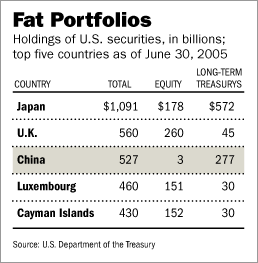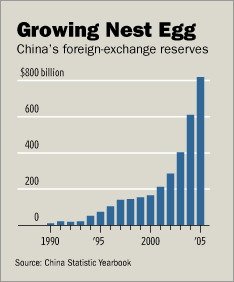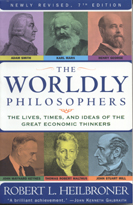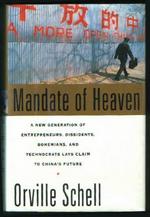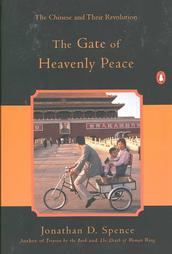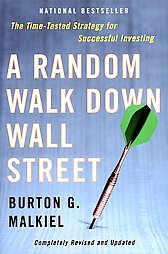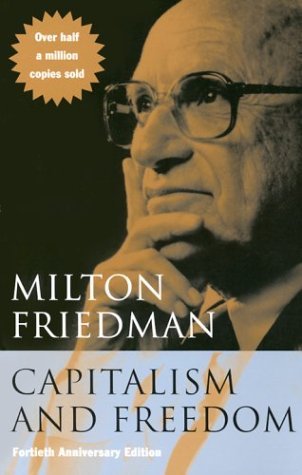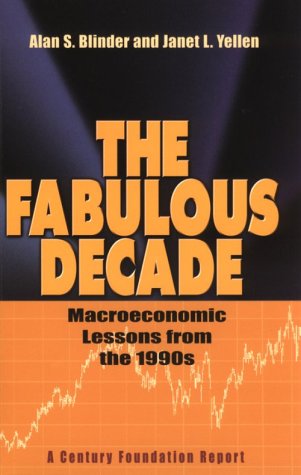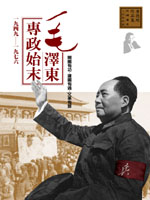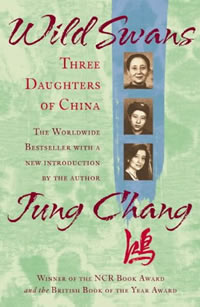Bank of China, Sinopec to Join Hang Seng Stock Index
From Bloomberg By Hanny Wan and Darren Boey
Bank of China Ltd. and China Petroleum & Chemical Corp., known as Sinopec, will be added to Hong Kong’s Hang Seng Index after a quarterly review of the stock benchmark, the compiler said.
The number of constituents on the Hang Seng will rise to 36
from 34, HSI Services Ltd. said in a statement after the market
closed today. No deletions were announced. The changes will take
effect on Dec. 4, the index provider said.
Bank of China and Sinopec, so-called H shares of companies
incorporated in mainland China, had been tipped for inclusion by
brokerages such as Nomura International (Hong Kong) Ltd.
The addition reflects the Chinese companies’ growing
presence on Hong Kong’s stock market. The exchange’s Web site
shows H shares at the end of October accounted for 21 percent of
the value of the main board, up from 1.5 percent at the end of
1997, the year the U.K. returned Hong Kong to China.
Bank of China and Sinopec’s inclusion “is evidence that H-
shares are getting more important,” said Kent Yau, deputy head
of research at Core-Pacific Yamaichi International in Hong Kong.
“If you look at the trading volume of H shares, they’re getting
bigger and bigger.”
The number of Hang Seng members will be gradually increased
to 38 to include H shares, HSI Services said in June. China
Construction Bank Corp., the nation’s fourth-largest lender, was
the first H share to join the stock benchmark after the index
compiler’s August quarterly review.
Shares of Bank of China, the nation’s second-largest lender,
have climbed 16 percent since they were sold in an initial public
offering at the end of May. Sinopec, Asia’s largest oil refiner,
has surged 47 percent this year.
“Bank of China was a bit of a surprise,” Yau said. “Short
term it’s going to get a boost. It’s positive news. Investors will
probably start to accumulate” before the changes take effect.
HSI Services determines constituents based on criteria such
as market value and trading volume. Adjustments would prompt
funds that mirror the stock benchmark, such as the $3.4 billion
Tracker Fund of Hong Kong, to buy stocks that are added.
Exchange-traded funds may have to buy HK$475.3 million
($61 million) of Sinopec shares and HK$579.4 million of Bank of
China shares in response to the inclusion in the Hang Seng, Sandy
Lee, an analyst at Nomura, said in an e-mail after HSI Services’
statement was released.
Bank of China has a market value of HK$851 billion, behind
HSBC Holdings Plc and China Mobile Ltd. among existing Hang Seng
Index members.
Sinopec, Asia’s biggest refiner, is valued at HK$562 billion,
which would put it behind Construction Bank, currently the
measure’s third-biggest company.
HSI Services also said it will start an index to measure the
H shares of Chinese financial-related companies from Nov. 27. The
Hang Seng China H-Financials Index will track five lenders
including Bank of China and Construction Bank, and three insurers
such as China Life Insurance Co.
Chinese Court Orders FTSE Xinhua Index Provider To Cancel Contract
A Chinese court said FTSE Xinhua Index Ltd. violated a contract with the Shanghai Stock Exchange related to pricing data, but the index provider said the ruling would have no impact on its ability to do business.
The Shanghai Pudong New Area District Court yesterday ordered cancellation of the year-old contract and ordered FTSE Xinhua Index to pay the exchange damages of $20,000, according to Fredy Bush, co-chairman of FTSE Xinhua. Ms. Bush said that her company will appeal the decision, and that in the meantime it has an alternative way to obtain Shanghai stock prices needed to calculate the values of the SGX FTSE Xinhua China A50 Index Futures contract, a product it licenses to trade in Singapore.
Will TCL Ultimately Withdraw From Europe?
From The Wall Street Journal
TCL Will Produce Fewer Sets in France As Expansion Falters
TCL Multimedia Technology Holdings Ltd. announced plans to overhaul its European television-manufacturing operations — the latest sign of problems with the company’s expansion strategy.
The changes will result in TCL producing fewer TV sets in France and, temporarily, other European countries. Those it produces won’t be sold under its own brand but will be supplied to other companies.
Its deal in 2003 to acquire the European TV business of Thomson SA marked one of the more significant moves by a Chinese company to expand overseas in recent years and left TCL in control of the Thomson brand in Europe and the RCA brand in the U.S.
TCL opened its first factory dedicated to flat-panel TV sets only last year, well behind Sony Corp., Samsung Electronics Co. and LG Electronics Co. Earlier this year, TCL moved to secure LCDs by forging a supply deal with LG.Philips LCD Co. LCDs are used in the most popular type of flat-panel TV sets.
The Discipline Inspection Committee’s Report on Shanghai Corruption and Chen Liangyu
From My CDT Post
According to sohuxiaobao blog, the Central Committee for Discipline Inspection recently submitted to the central Party leaders the fourth report on Shanghai corruption Investigation.
The report said the committee found 1322 inappropriate accounts (including 355 foreign-currency accounts), with savings amounting to 98,643 million yuan. Those accounts were owned by some Shanghai party officials, government officials, and their spouses and relatives, and were under pseudonyms.
The report said Chen Liangyu, together with his spouse and relatives, owned 53 accounts (9 of them are foreign-currency accounts), which were also under pseudonyms. Chen’s deposits in those accounts were as much as 274.1 million yuan.
The report said Chen Liangyu and his spouse and relatives owned nine houses and three companies in Shanghai. They also held 25 passports, 17 of them were under pseudonyms. The committee also found 19 flight tickets to Europe, Australia, and other countries. Those business-class tickets were for whole year travel.
The report also said Chen Liangyu had improper relationships with 11 women (some of them were married) in Shanghai, Hangzhou, Nanjing, Nantong, and other cities. Between September of 2001 and October of 2002, Chen was sued four times for swindles and rapes. Chen privately settled those cases with economic compensations (as much as 500,000 yuan), job offers, and project contracts.
-Click here to read more (Chinese)
-Also read CDT post The Aftershocks of the Shanghai Political Earthquake
Lenovo Hunting for Brand Exposure, Using NBA
From The Wall Street Journal, Lenovo is now scrambling to borrow exposure from NBA. Unfortunately, brand is not something that NBA can bring to Lenovo, brand is a long time accumulation of, most importantly, quality and reliability. Even if everybody hear about Lenovo, still few will buy Lenovo computers. Considering Lenovo’s dire profit margin, this marriage with NBA can only pull Lenovo to the red.
Lenovo Signs Deal With the NBA In Bid to Build Brand Awareness
By Jane Spencer
Chinese computer maker Lenovo Group Ltd. signed a multi-year marketing partnership with the National Basketball Association, as the company takes steps to build global brand awareness.
The deal comes as Lenovo is in the early stages of weaning itself of the IBM brand name. Last year, Lenovo emerged as the world’s third largest personal-computer maker behind Hewlett-Packard Co. and Dell Inc., after purchasing International Business Machines Corp.’s PC division for $1.25 billion.
As part of the deal with IBM, Lenovo earned the right to use IBM’s brand name until 2010 on its products. But the company isn’t allowed to use IBM’s name in marketing campaigns. As a result, the company is ramping up its efforts to build Lenovo’s name recognition in the U.S. and Europe, where most consumers are still far more familiar with the IBM name. Outside of China, more than 80% of Lenovo products still carry the IBM brand name.
China Posts Rules on Index Futures
From The Wall Street Journal, China Posts Rules on Index Futures
The China Financial Futures Exchange published draft rules on stock-index futures on its Web site, setting a minimum-access threshold that analysts said could deter some investors.
Under the draft rules, each investor would deposit funds equivalent to 8% of the value of the derivatives contract, which analysts said would put the minimum threshold at about 34,400 yuan, or about $4,350.
The rules also stipulate that a single investor can hold no more than 2,000 lots of single-month futures contracts at one time.
……
According to the draft rules, published yesterday for public comment, China’s first stock-index futures will be based on a unified index that groups 300 large-capitalization stocks on both the Shanghai and Shenzhen exchanges. The rules also stipulate that the price of stock-index futures can’t rise or fall by more than 10% in one day from the previous close.
Hong Kong is Set to be the Largest IPO Market
Fueled by the IPO frenzy in mainland China, Hong Kong is set to surpass London and New York to become the biggest market for initial public offerings, said the New York Times. The bulk of new listed companies in Hong Kong are from mainland, including the mammoth ICBC, which is to set a new world record on IPO value.
Read the NYT:
In a reflection of China’s growing prominence in international finance, Hong Kong is set for a banner year in global markets: More money will be raised by companies selling shares to the public here than on the biggest exchanges in New York and London.
And on Friday, pricing will be set for the world’s largest offering ever, that of China’s biggest bank, Industrial and Commercial Bank of China.
This week, long lines of individual investors showed up at downtown stalls to grab prospectuses for the bank’s initial public offering, while institutional investors have swamped the underwriters with orders. (continue)
Additional Reading on China’s Foreign Exchange Reserves
Following the preview post on China’s foreign exchange reserves, here is a comprehensive story on how China’s financial policy will shake the world economy.
From the Wall Street Journal By Andrew Browne
China’s Reserves Near Milestone, Underscoring Its Financial Clout
Sometime in the next few days, China’s holdings of foreign currencies and securities will top $1 trillion — a sum greater than the annual economic output of all but nine countries. The rapid growth in these so-called foreign-exchange reserves has made Beijing a colossus in the financial world, cushioned against shocks at home, but potentially able to trigger them abroad.
How China manages its growing pool of wealth has major repercussions for the global economy. Beijing’s reserves totaled $987.9 billion as of Sept. 30 and are growing by roughly $20 billion a month. That total compares with the about $1.2 trillion in assets under management at U.S. mutual-fund giant Fidelity Investments.
As the pot grows, the secretive and sophisticated portfolio managers at China’s central bank are trying gradually to boost their country’s returns on its foreign-exchange holdings, at least in part by making somewhat riskier but higher-yielding investments. Last spring, an unsuccessful effort to divine their intentions sparked a steep run-up in the price of gold.
For the U.S., how China deploys its reserves is a question of some consequence. Most of China’s currency reserves are invested in U.S.-dollar-denominated debt, such as U.S. Treasurys, which are considered the world’s safest investment. That has kept demand for U.S. Treasury notes high — and interest rates low. A change in that pattern could affect how much Americans pay for mortgage loans and other borrowings. Read the rest of this entry »
China’s Citic Bank plans dual listing, Plus Other Posts from CDT
China’s Citic Bank plans dual listing
Wal-Mart to Acquire China’s 2nd-largest Hypermarket Chain
China’s Wealthy Splurge $63 Million at Luxury Show in Shanghai
Business groups ‘blocking’ HK democracy
China’s Reserves Near $1 Trillion
Chief of China Youth Daily Sacked
From my CDT Post
Li Erliang, Editor-in-Chief of China Youth Daily, a newspaper owned by China Youth League, was sacked, Hong Kong newspaper Wen Hui Po reported. Li was replaced by Chen Xiaochuan, editor of Freezing Point, a weekly additional edition of the newspaper.
Li’s removal wasn’t elaborated by China Youth Daily, and the reason behind this is also unknown.
Chen Xiaochuan was appointed as the editor of Freezing Point after its former editor Li Datong was fired. Li’s dismissal was widely publicized.
The newspaper’s Party chief, Wang Hongqiu, was also removed, Wen Hui Po said.
-Click HERE to read the report (Chinese)
-Click HERE to read the report from China Times. The Taiwan Newspaper indicated that Li’s removal is due to the Freezing Point event early this year.
–More from CDT on Freezing Point
